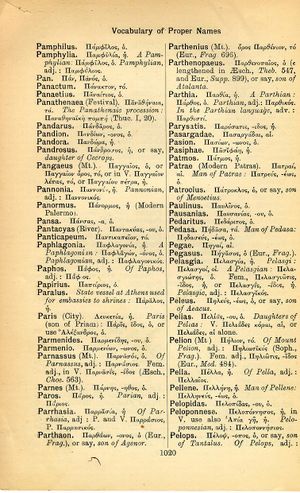Paris: Difference between revisions
Μὴ φεῦγ' ἑταῖρον ἐν κακοῖσι κείμενον → Ne fuge sodalem, cum calamitas ingruit → Lass einen Freund in Schwierigkeiten nicht im Stich
(Names) |
(6_11) |
||
| Line 3: | Line 3: | ||
<b class="b2">Paris</b> (<b class="b2">son of Priam</b>): Πάρις, -ιδος, ὁ, or use Ἀλέξανδρος, ὁ. | <b class="b2">Paris</b> (<b class="b2">son of Priam</b>): Πάρις, -ιδος, ὁ, or use Ἀλέξανδρος, ὁ. | ||
}} | |||
{{Lewis | |||
|lshtext=<b>Păris</b>: ĭdis, m., = Πάρις.<br /><b>I</b> The [[son]] of [[Priam]] and [[Hecuba]], also called Alexandros. As [[soon]] as he [[was]] [[born]], on [[account]] of an [[ominous]] [[dream]] of his [[mother]], he [[was]] [[exposed]] on Mount [[Ida]] to [[perish]]; he [[was]] [[there]] reared by the shepherds, and [[there]] he [[decided]] the [[dispute]] [[between]] [[Juno]], [[Pallas]], and [[Venus]] in [[favor]] of the [[last]], [[who]] promised him Helen, the [[most]] [[beautiful]] of women, as a [[reward]]; by [[carrying]] her [[off]] to [[Troy]], he [[was]] the [[cause]] of the [[Trojan]] [[war]], in [[which]] he [[fell]] by the [[arrow]] of [[Philoctetes]]: [[quapropter]] Parim pastores [[nunc]] Alexandrum vocant, Enn. ap. Varr. L. L. 7, § 82 Müll. (Trag. v. 74 Vahl.): [[culpatus]] [[Paris]], Verg. A. 2, 602: judicium Paridis spretaeque injuria formae, id. ib. 1, 27.—Voc.: Pari, Prop. 2, 2 (3), 47.—<br /> <b>B</b> [[Cicero]] [[sarcastically]] applies the [[name]] of [[Paris]] to C. [[Memmius]], on [[account]] of his relations [[with]] the wives of [[Lucullus]] and [[Pompey]], Cic. Att. 1, 18, 3.—<br /><b>II</b> The [[name]] of an [[actor]], a [[freedman]] of Domitia, Suet. Dom. 3; Tac. A. 13, 21; Juv. 6, 87.—<br /><b>III</b> The [[name]] of a pantomime, Suet. Dom. 10. | |||
}} | }} | ||
Revision as of 08:45, 13 August 2017
English > Greek (Woodhouse)
(City) Λευκετία, ἡ.
Paris (son of Priam): Πάρις, -ιδος, ὁ, or use Ἀλέξανδρος, ὁ.
Latin > English (Lewis & Short)
Păris: ĭdis, m., = Πάρις.
I The son of Priam and Hecuba, also called Alexandros. As soon as he was born, on account of an ominous dream of his mother, he was exposed on Mount Ida to perish; he was there reared by the shepherds, and there he decided the dispute between Juno, Pallas, and Venus in favor of the last, who promised him Helen, the most beautiful of women, as a reward; by carrying her off to Troy, he was the cause of the Trojan war, in which he fell by the arrow of Philoctetes: quapropter Parim pastores nunc Alexandrum vocant, Enn. ap. Varr. L. L. 7, § 82 Müll. (Trag. v. 74 Vahl.): culpatus Paris, Verg. A. 2, 602: judicium Paridis spretaeque injuria formae, id. ib. 1, 27.—Voc.: Pari, Prop. 2, 2 (3), 47.—
B Cicero sarcastically applies the name of Paris to C. Memmius, on account of his relations with the wives of Lucullus and Pompey, Cic. Att. 1, 18, 3.—
II The name of an actor, a freedman of Domitia, Suet. Dom. 3; Tac. A. 13, 21; Juv. 6, 87.—
III The name of a pantomime, Suet. Dom. 10.

